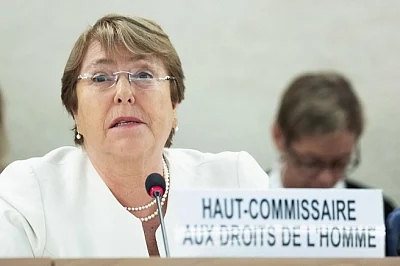Geneva, Sep 9 (IANS) UN High Commissioner for Human Rights Michelle Bachelet referred to the Kashmir issue and the National Register of Citizens (NRC) in Assam, in her opening statement at the 42nd session of the Human Rights Council here on Monday.
She included India in her specific reference to over 35 countries, and mentioned Pakistan only in reference to Kashmir, but made no reference to the human rights situation in Pakistan occupied Kashmir, Balochistan or Gilgit-Baltistan.
With regards to China, she only raised the issue of the current Hong Kong protests, and ignored the situation of Tibetan Buddhists in Tibet and even Muslims in Xinjiang province.
On Kashmir, she voiced deep concern at the impact of "recent actions by the Government of India on the human rights of Kashmiris, including restrictions on Internet communications and peaceful assembly, and the detention of local political leaders and activists".
"While I continue to urge the Governments of India and Pakistan to ensure that human rights are respected and protected, I have appealed particularly to India to ease the current lockdowns or curfews; to ensure people's access to basic services; and that all due process rights are respected for those who have been detained.
"It is important that the people of Kashmir are consulted and engaged in any decision-making processes that have an impact on their future," she said.
She also mentioned the NRC process in Assam.
She said the NRC "verification process in the Northeast Indian state of Assam has caused great uncertainty and anxiety, with some 1.9 million people excluded from the final list published on 31 August.
"I appeal to the Government to ensure due process during the appeals process, prevent deportation or detention, and ensure people are protected from statelessness," she writes.
In July too, the Office of the UN High Commissioner for Human Rights (OHCHR) report, its second on Kashmir in 13 months which was also released under Bachelet's oversight, had highlighted "serious human rights violations and patterns of impunity in Jammu and Kashmir".
But on Pakistan-occupied Kashmir, where the report had mentioned significant human rights abuses, its language had been markedly kinder.
On September 1, the Ministry of External Affairs had slammed as "incorrect" commentaries in foreign media about the National Register of Citizens, and explained the process of identifying illegal migrants in Assam as a "statutory, transparent, legal process mandated by the Supreme Court" and a "non-discriminatory process, which leaves no room for bias and injustice".
The MEA had said the NRC application form does not ask for the religion of the applicant and is "not an executive-driven process".
--IANS
rn/in
(At The Quint, we question everything. Play an active role in shaping our journalism by becoming a member today.)
